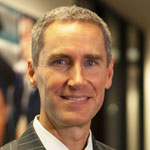As a collegiate baseball champion, battalion commander, class president, and submarine officer, Bob Ravener has groomed himself for the leadership positions he has held at several Fortune 200 corporations, including the likes of PepsiCo, Home Depot, and Starbucks, as well as his current position as executive vice president and chief people officer for Dollar General Corporation. After more than 25 years in the HR profession, Ravener has learned that, in both the military and the corporate worlds, trust, credibility, and teamwork are necessities for success.
1. A leader must have strong values and work ethic
Before he ever swung a bat for the Naval Academy, life threw Ravener more curve balls than most kids his age. Growing up in a dysfunctional family with alcoholic parents, he knew he wanted to break that cycle of dependence. “My father figure was my grandfather,” Ravener recalls. “He spent his entire adult life in the military and then the New York City Police Department. I saw the values he had, his tremendous work ethic, his ability to make a difference, his influence on others, and his strong set of values. That played a big role in my world.”
For Ravener education provided the solution. “I knew early in life that I’d have to set my sights on getting into college,” he says. Fueled by circumstance and encouraged by the men of authority with whom he was surrounded—including Owen McDonnell, his influential principal, and Walt Novak, his baseball coach—Ravener set three goals for himself: study hard, compete relentlessly, and make a difference as a leader in school. He hit his textbooks hard, becoming class president, but he also hit .494 his junior year for New Fairfield High School in Connecticut. Those accomplishments so impressed the United States Naval Academy that he was offered a congressional appointment to attend.
2. Build credibility and trust
As a 23-year-old naval officer, Ravener assumed the tall order of leadership on a US Navy submarine, often giving orders to sailors twice his age. He couldn’t tell grown men how to do their jobs without first gaining credibility, and he found that the quickest way to earn a sailor’s respect was through their aspirations. “It really takes building trust,” Ravener says, “and you do that by taking a personal interest in an individual. I’ve been able to apply that same principle to my career. If I can help others achieve their own goals, there is great satisfaction in watching them succeed. And when people know you have a stake in their future, that accelerates building trust and credibility. They know you’re not just in it for yourself.”
3. Respect the experiences, capabilities, and opinions of those you lead
If someone makes a mistake at the office, the consequences may not be as dire as on a 150-man, 8,600-ton nuclear submarine, but to Ravener, the decision-making dynamic is similar. Both in the Navy and in the corporate world, everyone has a job to do, he says. “There’s a time for gathering input while building consensus, and a time for being directive. In more conventional scenarios, and certainly corporate settings, you’re going to be able to build a better solution by getting more people involved and taking the best thinking that creates improved outcomes.”
Every year, Ravener pools his team’s opinions to form his HR strategy. The entire department attends a summit seven months before the New Year, and the strategy is formulated with everyone’s contributions. “It’s amazing when you ask people their opinions what great things they’ll come up with,” Ravener says. “People will give leaders great credit for trying. It may be awkward at first, but if you’re genuinely trying and involving them, they’ll buy in, and, as the saying goes, recognize that the whole is greater than the sum of its parts.”
4. Create an organization where people want to come to work every day
Whether building off the wild success of Dollar General’s rapid growth—21,000 jobs and almost 3,000 stores added in the last five years—or picking up the pieces in a manufacturing plant, as he did while working for PepsiCo in Petersburg, Virginia, Ravener has seen the positive results of building a community within a corporation for its employees. When Ravener and his business partners arrived at the bottling plant PepsiCo had acquired in Petersburg, it was in a state of disarray. Workplace angst was rampant as the Southern Christian Leadership Conference boycotted the previous owner in a protest against discrimination, and local media painted a picture of the company as a community adversary. Through consistent communication with the workforce, an open-door policy, internal promotions, improved diversity, and a firm commitment that corporate Pepsi was a different company with different values and practices, Ravener and his colleagues turned the facility around in 90 days.
There is a systemic plan to develop talent at Dollar General that Ravener and CEO Rick Dreiling have initiated. Training magazine lauded Dollar General the last two years on its list of Top 125 companies for these measures. And, in June of 2012, Dollar General hosted an internal career fair that attracted more than 3,300 employees, 1,000 of which have since been promoted. “It’s very rewarding when you can tell people the only limiting factor is their own goals,” Ravener says. “If they build their lives around goals, their desire, work ethic, and capability will take them as far as they want to go.” The plan also established talent-development centers, which evaluate leaders interested in being promoted and works them through a series of exercises to determine readiness. More than 700 high-performing leaders have gone through the centers and almost 300 have already been promoted. At the more senior level, Ravener and Dreiling led a corporate-officer-level leadership session, coined Senior Executive Leadership Forum.
For as layered of an approach that Dollar General takes in providing development opportunities to its more than 90,000 employees, Ravener believes the formula is simple, yet often missed. “Employees are people with lives beyond the four walls of the workplace,” he says. “They have hopes and dreams and want to excel. We have to recognize that and give them the tools to make those aspirations a reality.”

